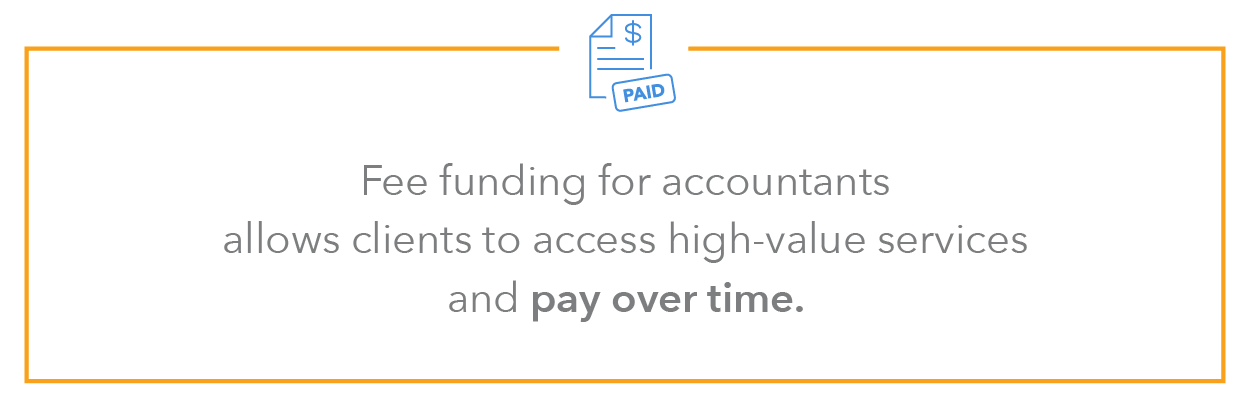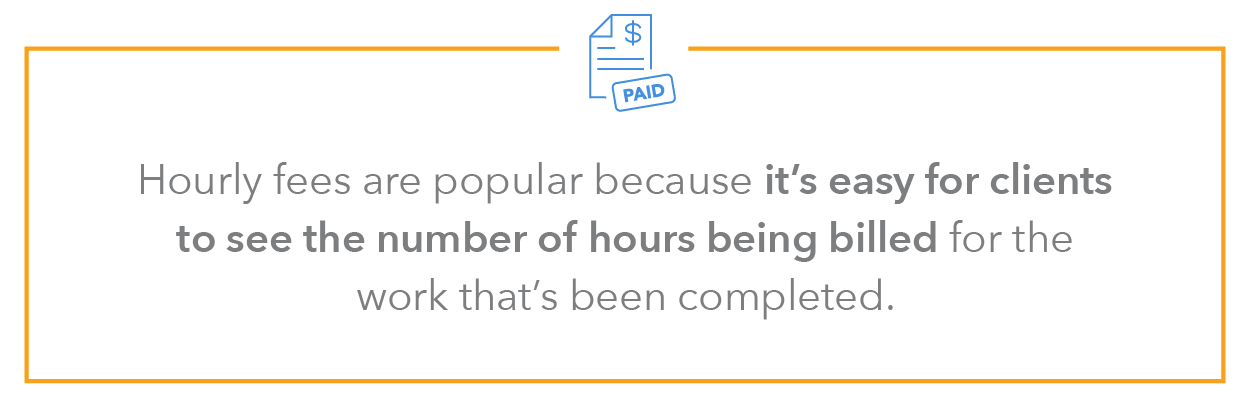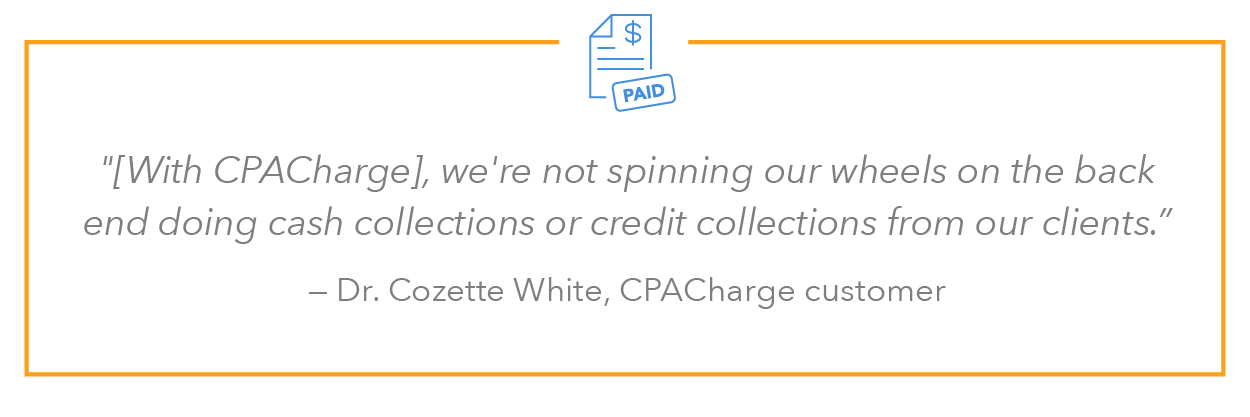Financial Technology
Pricing Accounting Services: The Power of Fee Funding

The rise of accounting fee funding solutions and other types of new fee funding that became popular during the pandemic have now become a standard and expected payment option for consumers.
In today's competitive landscape, there’s a lot riding on the client experience. In their Future of CX report, PwC surveyed 15,000 consumers and found that 1 in 3 will leave a brand they love after a single bad experience. Additionally, 92% would completely abandon a company after two or three negative interactions. Another recent survey of nearly 2,000 business professionals from SuperOffice found that customer experience was the top priority for a majority of businesses in the next five years.

This demonstrates the importance of providing an excellent experience for clients—meeting them where they are, and giving options that offer them the best outcomes. One way to achieve this is through flexible and convenient payment options. Fee funding for accountants allows clients to access high-value services and pay over time. This approach differs significantly from traditional payment methods by providing clients with control over their payment schedules, improving satisfaction and loyalty.
In this article, we’ll discuss:
- Strategies for leveraging fee funding to elevate your client experience
- How to price accounting services and achieve better outcomes for clients
- Traditional payment methods and where they fail
- How businesses can stay ahead in today's customer-centric landscape and secure long-term success
Top Pricing Strategies for Accounting Services
As businesses continue to adapt to the preferences of a new generation of consumers, alternative pricing strategies have emerged. These include flexible payment options such as professional fee funding, which gained popularity with online shoppers during the pandemic. This shift towards flexible payments has benefits for both consumers and vendors alike. Let’s go over some of the pricing accounting services below.
Flat Fees
Flat Fees are typically a single, all-inclusive charge for a designated and limited amount of work. Often associated with large “storefront” accounting firms, flat fees are primarily utilized by consumers with smaller incomes and limited assets. Flat fees usually do not include extensive consultation services, and the amount of “face time” between client and accountant is limited, usually to a single meeting. While flat fees are only viable for a small and very specific group of consumers, they can also serve as a valuable “entry point” for clients whose accounting needs–and accompanying services and accounting fees–will continue to grow over the years.

Hourly Fees
Hourly Fees are common in many different professions and are based on a “per-hour” rate set by the accountant or firm. An accountant hourly rate includes the time spent on planning and consulting with the client, the number of hours spent completing the actual work, and any time required post-completion of the designated project. Hourly fees are popular because it’s easy for clients to see the number of hours being billed for the work that’s been completed. One challenge is explaining to clients exactly how many hours are required for a given task, the added costs of unplanned work, and the fact that clients will be charged for items like additional consultation services.
Blended Fees
Blended Fees utilize a combination of fee models and are designed to serve the needs of the client best while providing proper compensation for the accountant or firm. Blended fees may include an initial flat fee to cover services like a consultation and upfront work. After the work covered in the flat fee is completed, the accountant may charge an accountant hourly rate or other agreed-upon amount for work on any additional or unplanned services. Blended accounting fees provide transparency to the client, as well as ensure that the accountant is adequately compensated for the value of services delivered.
Value-Based Pricing
Value-based pricing offers a more flexible and client-focused approach. This billing model emphasizes the value that a firm delivers to its clients rather than the time spent on tasks. By charging a flat rate for each package or service, firms can decouple their profitability from the number of hours worked, allowing them to focus more on delivering the best results for their clients without concern about the ticking clock.
*Pro tip: Learn more about value-based pricing for accountants in this e-book. *
What is Fee Funding for Accountants?
Fee funding for accountants is a payment plan option that gives their customers the option to purchase products or services while paying for them in installments over time. Regardless of whether they make the payments, the merchant is paid in full upfront. This allows consumers to get the goods and services they need without worrying about having the funds to pay the full balance upfront or needing to rely on other money-lending services. This also greatly benefits the merchant, who can now maintain a steady cash flow and offer their services to more consumers who might otherwise choose another merchant that can satisfy their need for a flexible payment option.
Accounting Fee Funding vs. Traditional Payment Plans
Fee funding and traditional payment plans share some similarities, but you’ll want to choose the plan that works best for you and your clients. Let’s take a look at the pros and cons of each payment plan.
Fee Funding
Pros:
- Appeals to a greater number of potential clients
- Increases consistent cash flow
- Guarantees payments in full
- Increases the speed at which you get paid
- Positions your firm as a leader in modern service options
Cons:
- Can be intimidating to implement
- Clients may not want to apply for fee funding
- Difficult to offer for cash payments
Traditional Payment Plans
Pros:
- Simple to understand for clients and merchants
- Familiar for many clients
- Clients can choose to pay with cash
Cons:
- Requires management and tracking to ensure full payment over time
- Can result in unpaid invoices or collections
- Small deposits over time can slow cash flow
Which Accounting Pricing Structure is Best for Your Clients?
Pricing accountant services with clients in mind can help you increase acquisition and retention and ultimately scale your business. According to the 2023 Global Fraud and Payments Report from Cybersource, consumers are 63% more likely to shop with merchants that offer their preferred payment options.
But how can you determine which payment options are best for your clients? Providing flexible payment options allows businesses to accommodate clients while improving cash flow—and ultimately positions businesses as leaders in adopting innovative payment technologies. This reduces time spent on collection efforts and increases overall profitability. For example, CPACharge's flexible billing software can save you 20 minutes per invoice, plus the hours reclaimed by no longer having to follow up on collections.
How to Offer Clients Professional Fee Funding
While there are many fee lending solutions available, not all of them were made with the specific needs of the accounting industry in mind. CPACharge offers an accounting fee funding solution, powered by Affirm, made specifically for accounting professionals to provide a client-centric experience while maintaining a steady cash flow.
CPACharge allows you to receive the full invoiced amount upfront while your clients pay in installments over time. A third-party lender, Affirm, handles the collection of installment payments, and you’re never responsible for the unpaid balance. Learn more about CPACharge’s Pay Later option here.

Go Beyond the Ordinary for Your Clients
Achieving greatness involves going beyond the mark for your clients and putting their needs first. Accounting fee funding offers a pathway to help businesses flourish by providing a personalized payment experience, eliminating the need to chase payments, and ultimately producing better outcomes for clients. To discover how you can get paid faster, streamline your billing process, and provide a better payment experience for clients, book a demo with CPACharge today.
Interested in joining our monthly newsletter?
